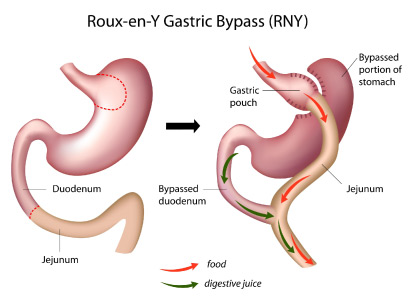What Is the Success Rate of Bariatric Surgery?
Bariatric surgery, also known as weight loss surgery, can be a very effective method to lose excess weight.
But it’s important to understand that there is more to long-term weight loss than just a surgical procedure. A person’s plan to manage obesity and the health-related problems that accompany it can be very complicated and involved.
Bariatric surgery is performed at the start of a long-term weight loss plan that will hopefully address and resolve accompanying illnesses like diabetes or high blood pressure.
However, what is the actual long-term success rate of gastric bypass surgery?
And for those who had successful weight loss surgeries, or for those who had weight regain, what happened, or didn’t happen on their weight loss surgery journey?
What is the long-term bariatric surgery success rate?
The long-term success rate of bariatric surgery is between 68% and 74%, and studies have shown that the beneficial effects on weight loss are maintained for up to 20 years after gastric bypass surgery.
This means that most patients who undergo bariatric surgery maintain 50-75% excess weight loss, with an average patient losing at least 100 pounds.
Weight loss surgery patients typically lose the most weight 1-2 years after their bariatric surgery and see substantial weight improvements in obesity-related conditions.
What is the long-term gastric bypass surgery success rate?
93 percent of gastric bypass surgery patients maintained at least a 10 percent weight loss from their baseline, 70 percent maintained 20 percent excess weight loss, and only 40 percent maintained at least a 30 percent weight loss after 12 years, according to a long-term study of patients who had undergone gastric bypass.
While not perfect results, many of those who underwent gastric bypass surgery managed to keep a good percentage off.
Gastric bypass surgery is known as the “gold standard” in weight loss surgeries, but there is still a chance you could experience weight regain.


Why is bariatric surgery performed?
Bariatric surgery, also known as weight loss surgery, is a surgical procedure performed for people who are morbidly obese (with a body mass index greater than 40 or a body mass index greater than 35 with at least one obesity-related illness).
The goal of bariatric surgery is to help the patient achieve long-term weight loss and help decrease the risk of obesity-related comorbidities or diseases such as:
- diabetes
- high blood pressure
- hypertension
- cardiovascular disease
- stroke
- sleep apnea
- gout
- heart disease
These weight loss surgeries aim to help severely obese patients lose excess weight, reduce their body mass index, and reduce the risk of potentially life-threatening weight-related health problems.
The most common weight loss surgery is gastric bypass surgery.
Read More Weight Loss Surgery FAQs
What is gastric bypass surgery?
Roux-en-Y or gastric bypass surgery is a weight loss surgery that involves creating a smaller stomach pouch from your stomach to help the patient lose weight.
The surgery works by changing the anatomy (or position) of the stomach and small intestines.
The smaller stomach is connected directly to the middle section of your small bowel, which allows food to bypass large parts of your stomach and duodenum, where nutrient absorption normally occurs.

This weight loss surgery helps limit calorie intake by increasing restriction of food intake due to less space in the upper GI and decreasing caloric absorption. The new stomach position and size change the appetite, satiety (feeling full), and metabolism (how your body burns calories), all of which can help the patient lose weight. Learn more about gastric bypass surgery here.
Gastric bypass surgery & diseases
It isn’t only the body mass index that an excess weight loss surgery can positively affect, but it can also completely eradicate any dangerous diseases.
A study was done on patients 12 years after weight loss surgery and it indicated incredible durability of weight loss, effective remission, and prevention of hypertension, type 2 diabetes, and dyslipidemia.
The effect gastric bypass has on diseases that existed before the surgery has a positive correlation to the after-effects of weight loss. Long-term gastric bypass surgery is effective at improving these obesity-related conditions.
Also, gastrointestinal hormones play a large role in the regulation of hunger and satiety. With gastric bypass, the surgery changes the action of specific hormones, such as ghrelin or the “hunger hormone.”
Those who have gastric bypass surgery have lower ghrelin levels than those who lose weight naturally, and this feeling of “fullness” or satiety is long-term.
Mental health & gastric bypass surgery
While the physical effects of weight loss surgery are often noticed first, the mental effects can also change the surgery’s long-term effectiveness in helping patients lose weight.
According to this study, the most common mental health conditions of patients seeking gastric bypass surgery were depression and binge eating disorder.
While post-op data about eating disorders was inconclusive, the weight loss surgery data shows strong numbers that showed a decrease in patients with depression and the severity of depressive symptoms.
While some studies indicate positive correlations, others show different data. According to this study, the long-term success rates can be as low as 50%, with low numbers due to not the actual surgery itself but psychological issues post-op.
Patients who have several additional health conditions or who had pre-existing mental health problems before their surgeries were less likely to do well after surgery than those with only one disease state (obesity).
It’s important to note that a positive mental attitude and an approach to healthy living after the weight loss surgery can be contributing factors to helping severely obese patients keep the excess weight off for good.
Managing lifestyle changes after weight loss surgery
We discussed earlier that weight loss surgery is the first step to long-term excess weight loss success.
Those who have been successful in keeping their excess weight off and maintaining a healthy lifestyle after surgery have made major changes in how they eat and live.
Successful weight loss patients who don’t experience weight regain understand that gastric bypass is a lifelong commitment and not just something they do for themselves right now.
They find ways to stay active by engaging in enjoyable activities like walking or exercising and are extremely mindful of how they eat and when they eat.
Keeping up with the physical and nutritional part of the gastric bypass surgery is a key element to keeping the excess weight off – for good.